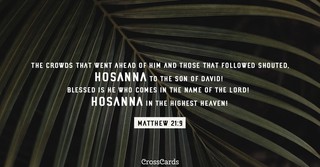
- Recent Translations
- All Translations
Matthew 21:9
Share
Settings
Matthew 21:9 in Other Translations
Matthew 21:9 Meaning and Commentary
And the multitudes that went before
That is, that went before Christ; accordingly the Syriac, Arabic, Persic, and Ethiopic versions, and Munster's Hebrew Gospel, read, "that went before him": these seem to be the much people that met him from Jerusalem,
and that followed him;
which were perhaps those that came from Jericho, and other parts;
cried, saying, Hosanna to the Son of David:
by calling Jesus the Son of David, they owned and proclaimed him to be the Messiah; this being the usual title by which the Messiah was known among the Jews; see the note on ( Matthew 1:1 ) and by crying and saying Hosanna to him, which was done with loud acclamations, and the united shouts of both companies, before and behind; they ascribe all praise, honour, glory, and blessing to him, and wish him all prosperity, happiness, and safety. The word is an Hebrew word, and is compounded of (an) , and (heyvwh) , which signifies, "save I beseech"; and which words stand in ( Psalms 118:25 ) to which the multitude had reference, as appears from what follows; and are formed into one word, (anevwh) , "Hosana", or "Hosanna", in which form it frequently appears in the Jewish writings; and because of the often use of it at the feast of tabernacles, that feast was called "Hosanna", and the seventh day of it was called (hbr) (anevwh) , "the great Hosanna" F4. Moreover, the "Lulabs", or the bundles made of branches of palm trees, and boughs of willow and myrtle, which they carried in their hands at the feast of tabernacles, often go by this name: it is said F5,
``the Egyptian myrtle is right or fit (anevwhl) , "for the Hosanna".''That is, to be put into the "Lulab", or bundle of boughs and branches, which was carried about, and shaken at the above feast. Again F6,
``it is a tradition of R. Meir, that it was the practice of the honourable men of Jerusalem, to bind their "Lulabs" with golden threads says Rabbah, these are they (anevwh yldgm) , "that bind the Hosanna": the gloss on it is, "that bind the Lulabs", of the house of the head of the captivity; for in binding the Hosanna of the house of the head of the captivity, they leave in it an hand's breadth and says the same Rabbah, a man may not hold an Hosanna in a linen cloth.''Once more F7,
``says R. Zera, a man may not prepare (anevwh) , "an Hosanna" for a child, on a good day.''Sometimes the Hosanna seems to be distinguished from the "Lulab", and then by the "Lulab" is meant, only the branches of palm tree; and by the Hosanna, the boughs of willow and myrtle; as when F8,
``Rabbah says, a man may not fix the "Lulab", (anevwhb) , "in the Hosanna".''And a little after says the same,
``a man may not bind the "Lulab" with the "Hosanna".''Now these bundles might be so called, because they were lifted up and shaken, when the above words out of ( Psalms 118:25 ) were recited: for thus it is said F9,
``when do they shake, that is, their "Lulabs", or "Hosannas?" At those words, "O give thanks unto the Lord", ( Psalms 118:1 ) the beginning and end; and at those words, "Save now I beseech thee", ( Psalms 118:25 ) . The house of Hillell, and the house of Shammai say also at those words, "O Lord I beseech thee, send now prosperity": says R. Akiba, I have observed Rabban Gamaliel and Rabbi Joshua, that all the people shook their Lulabs, but they did not shake, only at those words, Save now I beseech thee, O Lord.''Hence some have thought, that these are meant by the Hosanna in this text; and that the sense is, that the multitude cried, saying, These branches of palm trees we carry in our hands, and strow by the way side, are in honour to the Son of David, the true Messiah, Jesus of Nazareth: but then this sense will not agree with the following clause, "Hosanna in the highest": it may therefore be further observed, that certain prayers and songs of praise, were called "Hosannas": hence we read F11 of (tbv lv twnevwh) , "the Hosannas of the sabbath"; which consisted of various sentences in praise of the sabbath, and thanksgiving to God for it, and are concluded with this word "Hosanna"; and of various petitions that God would save them, as he had done others; and at the end of each petition, is this word. As also of F12 (hbr anevwh lv twnevwh) , "the Hosannas of the great Hosanna"; which are certain words of prayer and praise, used on the seventh day of the feast of tabernacles: and whereas at that feast the "Hallell", or hymn, was sung, which concluded with the 118th Psalm where the words, "Save now I beseech thee, O Lord", stand, from whence this word is formed; the true sense and meaning of it here appears to be this; that the multitude that attended Christ to Jerusalem, as they went along, sung songs of praise to him, as the true Messiah; particularly, applying the above passage to him, and earnestly wished him all success and prosperity; and importunately prayed for salvation by him; adding,
Blessed is he that cometh in the name of the Lord:
which words are taken also out of ( Psalms 118:26 ) and is an ascription of blessing and praise to Jesus, the Messiah; who being sent by God, came from him with his authority, as his apostle, and as representing him; and contains another petition for him, that he might be crowned with the blessings of divine goodness, for his people; and be blessed and praised by them, for all the spiritual blessings they are blessed with in him. And very properly and pertinently were those words used and applied to Christ, since the Psalm from whence they are taken belongs to him: the whole of it is, by some Jewish interpreters F13, said to be spoken concerning him; and particularly, he is designed in ( Psalms 118:22 ) by the stone the builders refused, as is clear from ( Matthew 21:42 ) of this chapter, and from ( Acts 4:11 ) and ( 1 Peter 2:7 ) and which is allowed by some Jewish writers, ancient and modern F14; and ( Psalms 118:27 ) the words following these, are by them interpreted of the days of the Messiah, the times of Gog and Magog, and the future age {o}. And others of them said, as Mark observes, ( Mark 11:10 ) . "Blessed be the kingdom of our father David, that cometh in the name of the Lord"; (See Gill on Mark 11:10). Moreover, as it may be thought others of the people said, as Luke relates, ( Luke 19:38 ) .
Blessed be the king that cometh in the name of the Lord;
(See Gill on Luke 19:38). To which is added,
Hosanna in the highest;
that is, let songs of praise be sung to God, who is in the highest heavens, for all his grace and goodness vouchsafed to the sons of men, through Christ his beloved Son; or let not only all salvation, happiness, and prosperity attend the Messiah, David's son, here on earth, but all glory and felicity in the highest heavens, above which he will be exalted.
F4 Seder Tephillot. fol. 298. 2.
F5 T. Bab. Succa, fol. 33. 1.
F6 Ib. fol. 37. 1.
F7 Ib. fol. 45. 2. Vid. Maimon. Hilch. Lulab, c. 8. sect. 10.
F8 Maimon. Hilch, Lulab, fol. 37. 2.
F9 Misn. Succ, c. 3. sect. 9.
F11 Seder Tephillot, fol. 297. 1.
F12 Ib. fol. 298. 2.
F13 Vid. Kimchi in Psal. cxviii. 1.
F14 Zohar in Exod. fol. 93. 3. Jarchi in Mic. v. 2.
F15 T. Hicros. Megilla, fol. 73. 1.




